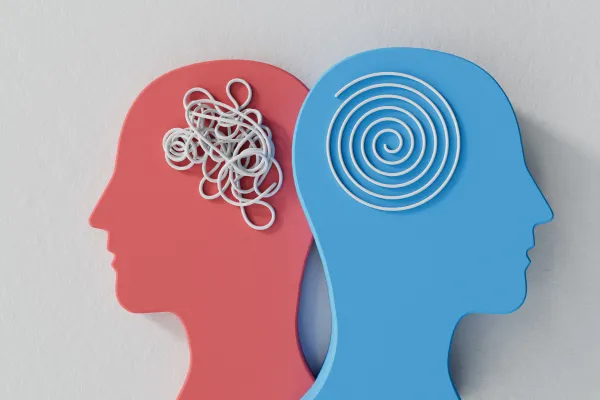

10 Common Myths About Mental Health
Mental health has come a long way in terms of awareness, but there’s still a lot of confusion and stigma floating around. People whisper about therapy like it’s a dirty little secret, brush off anxiety as just “overthinking,” or equate depression with laziness. These myths don’t just spread misinformation. They hurt real people who are already struggling.
So let’s clear the air.
In this blog post, we’re going to bust ten common mental health myths wide open. Whether you're someone dealing with your own mental health problems or supporting a loved one through theirs, this guide will help you separate fact from fiction in a way that’s approachable, real, and, above all, compassionate.
What is Mental Health, Anyway?
Before going through the list of myths, it helps to get on the same page. Mental health isn’t just about avoiding mental illness. It’s about how we think, feel, and act. It impacts how we handle stress, relate to others, and make choices in every season of life.
Just like physical health, mental health exists on a spectrum. Some days are better than others, and that’s completely normal. But just like we’d treat a persistent cough or chronic pain, we deserve to address persistent emotional pain, too.
As Dr. Noam Shpancer, professor of psychology at Otterbein University in Westerville, puts it: “Mental health is not a destination, but a process. It's about how you drive, not where you're going.”
With that in mind, let’s look at some of the most common (and harmful) myths that can get in the way of that healthy mental "drive."
Myth #1: Mental health problems are rare.
Fact: Actually, they’re incredibly common.
According to the World Health Organization, one in four people will experience a mental health issue at some point in their lives. That’s not rare; that’s real life. Depression, anxiety, burnout, and trauma-related struggles show up in every neighborhood, workplace, and family. You’re not alone, and you’re definitely not broken.
Myth #2: People with mental health issues are just being dramatic.
Fact: Mental illness is not a personality flaw or an overreaction.
This myth is especially damaging because it minimizes pain. Saying someone is “too sensitive” or “just seeking attention” overlooks the very real biological, psychological, and social roots of conditions like depression and anxiety.
As Brene Brown reminds us: “Empathy has no script. There is no right way or wrong way to do it. It’s simply listening, holding space, withholding judgment, emotionally connecting, and communicating that incredibly healing message of ‘You’re not alone.’”
Myth #3: Therapy is only for people with severe problems.
Fact: Therapy is for everyone.
Think of therapy as emotional maintenance, like going to the gym for your mind and soul. You don’t have to be in crisis to benefit from talking to a professional. Therapists can help you manage stress, improve relationships, build self-awareness, and reach goals.
Even Olympic athletes work with coaches. Why wouldn’t we get coaching for our mental wellness, too?
Myth #4: Talking about mental health makes things worse.
Fact: Silence is actually what makes it worse.
There’s a big difference between dwelling on pain and processing pain. Suppressing emotions doesn’t make them go away; it buries them and buried emotions have a sneaky way of leaking out in our relationships, work, and health.
When we talk about what we’re going through, we give it light, and in that light, healing starts.
Myth #5: Medication is a cop-out or “the easy way out.”
Fact: Medication can be a valid and life-saving treatment.
For some, therapy alone is enough. For others, a combination of therapy and medication creates the best results. Just like someone with diabetes may need insulin, someone with depression may need antidepressants. It’s not weakness, it’s wisdom.
Of course, medication should always be prescribed by a trained professional, and finding the right one may take time. But needing help doesn’t make you any less strong.
Myth #6: Mental health issues are always caused by trauma or bad parenting.
Fact: While the environment plays a role, it’s not the whole story.
Mental health conditions can be influenced by many factors including genetics, brain chemistry, personality, life circumstances, and, yes, trauma. But blaming someone’s struggles solely on their childhood or family does a disservice to both the person and their loved ones.
We are all complex, layered beings. No single cause defines us.
Myth #7: If you look “fine,” you must be fine.
Fact: You can’t always see mental health struggles from the outside.
Smiling faces can hide deep sadness. The “high-functioning” friend who juggles everything perfectly might be battling anxiety. Mental health doesn’t always look like crying in bed. Sometimes it’s overworking, people-pleasing, or numbness.
So instead of assuming, let’s ask. Let’s check in. Let’s create space for honesty.
Myth #8: People with mental illness are violent or dangerous.
Fact: This myth is not just false, it’s harmful and stigmatizing.
Studies consistently show that people with mental illness are far more likely to be victims of violence than perpetrators. Linking mental illness with danger contributes to fear, discrimination, and isolation.
Let’s focus on compassion and education, not fear-based narratives.
Myth #9: You just need to “snap out of it.”
Fact: Healing isn’t about willpower; it’s about support and strategy.
Telling someone to “cheer up” or “just be positive” is like telling someone with a broken leg to walk it off. Mental health conditions require real treatment, just like physical ones. Recovery takes time, effort, and a whole lot of patience, not pressure or guilt.
Myth #10: Once you get help, you’ll never struggle again.
Fact: Healing isn’t linear.
You can make progress and still have hard days. That doesn’t mean you’re failing. It means you’re human. Mental wellness is more like a dance than a straight path. Two steps forward, one step back, and sometimes a full pause to catch your breath.
What matters is that you keep showing up for yourself. Again and again.
So, What Can You Do?
Here are a few simple steps to move forward:
1. Educate yourself – Read articles, follow mental health advocates, and learn about the conditions that affect you or your loved ones.
2. Talk about it – Share your story or listen to others. Normalize mental health conversations at home, work, and school.
3. Seek support – Whether it's a therapist, coach, support group, or trusted friend, don’t carry the load alone.
4. Be kind – To others, yes. But especially to yourself. Healing is not a competition.
5. Practice mental hygiene – Just like brushing your teeth, build small daily habits that support your emotional well-being, such as journaling, mindful breathing, getting enough rest, moving your body, and staying connected.
ABOUT US

Jeanne Prinzivalli
Therapist + Coach
I help ambitious, anxious women learn how to trust and put themselves first, so they can stop burning themselves out trying to meet other people's expectations.
SELF CARE CONTINUUM
CLIENT LINKS
LET'S CONNECT
Let’s get you started on relief from self-sabotaging patterns so you can move forward with your life and career passions.
Self Care Continuum Copyright © 2023.




